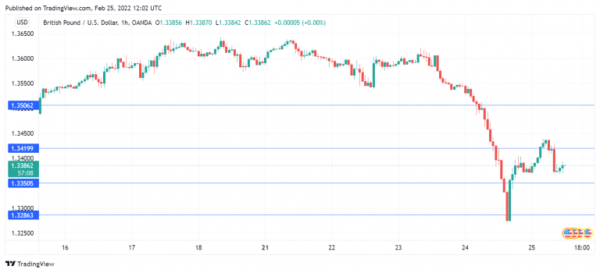The pound is calm on Friday, after taking a tumble on Thursday and falling 1.28%. It was the pound’s worst one-day performance since November 2021. Investors appear to be taking a wait-and-see attitude on Friday, as the fighting continues in Ukraine, with Russian forces reported in the suburbs of the capital Kyiv.
BoE says inflation to hit above 7%
A day before the Russian invasion of Ukraine, The Bank of England policymakers had a grim message for a parliamentary committee. Deputy Governor Ben Broadbent noted that the BoE is facing its toughest challenge in decades. Inflation continues to rise and the BoE feels compelled to respond by raising rates, but this will exacerbate the cost of living crisis faced by households. Governor Bailey made reference to the crisis in Ukraine, saying that the surge in energy prices would hurt consumers and that the Ukraine crisis meant there was an upside risk on energy prices.
The BoE is projecting that inflation will rise above 7%, and there is little doubt that the central bank will have to hike rates in order to bring inflationary pressures back down. The BoE has raised rates in the past two meetings and a third hike would be unprecedented, but the bank is under strong pressure to put a lid on inflation which shows no signs of easing, especially with the Russian invasion of Ukraine which could send oil prices soaring.
The Russian attack on Ukraine sent the US dollar soaring on Thursday, as panicky investors sought the safety of the greenback. This sent the pound sharply lower, but the currency did recover some ground after President Biden announced additional sanctions. These were not as severe as feared, as they did not target energy companies in Russia nor was Russia excluded from using SWIFT, the global internet payment network. With western Europe dependent on Russia for 40% of its natural gas needs, it appears that the West’s bark against Russia will be tougher than its bite.
- There is resistance at 1.3662 and 1.3731
- There is support at 1.3506 and 1.3419

